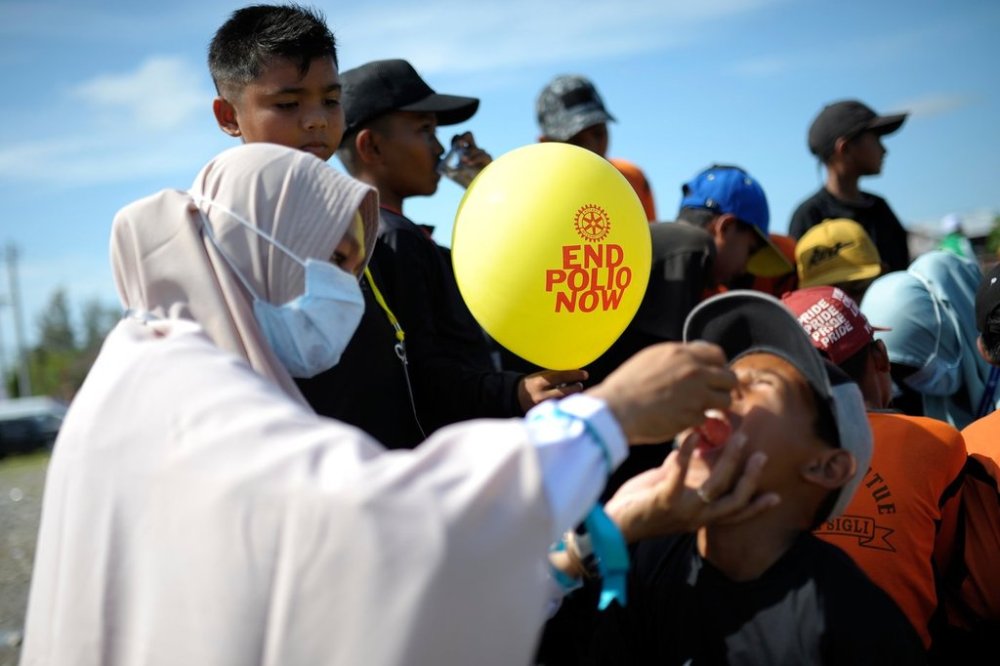WHO declares end of Indonesia’s polio outbreak following yearslong vaccination campaign
Advertisement
Read this article for free:
or
Already have an account? Log in here »
To continue reading, please subscribe:
Monthly Digital Subscription
$1 per week for 24 weeks*
- Enjoy unlimited reading on winnipegfreepress.com
- Read the E-Edition, our digital replica newspaper
- Access News Break, our award-winning app
- Play interactive puzzles
*Billed as $4.00 plus GST every four weeks. After 24 weeks, price increases to the regular rate of $19.95 plus GST every four weeks. Offer available to new and qualified returning subscribers only. Cancel any time.
Monthly Digital Subscription
$4.99/week*
- Enjoy unlimited reading on winnipegfreepress.com
- Read the E-Edition, our digital replica newspaper
- Access News Break, our award-winning app
- Play interactive puzzles
*Billed as $19.95 plus GST every four weeks. Cancel any time.
To continue reading, please subscribe:
Add Free Press access to your Brandon Sun subscription for only an additional
$1 for the first 4 weeks*
*Your next subscription payment will increase by $1.00 and you will be charged $16.99 plus GST for four weeks. After four weeks, your payment will increase to $23.99 plus GST every four weeks.
Read unlimited articles for free today:
or
Already have an account? Log in here »
JAKARTA, Indonesia (AP) — The World Health Organization has declared Indonesia’s polio outbreak officially over, following nearly three years of intensive response efforts, officials said Friday.
Indonesia has remained largely polio-free as the highly contagious disease was declared eliminated in the country in 2014. But eight years later, an outbreak emerged in the country’s conservative Aceh province, prompted by a dangerous combination of consistently low routine immunization and unhealthy environmental conditions. In 2021, only 50.9% of infants born in Aceh received polio vaccination.
Officials say that polio immunization rates in Aceh are well behind the rest of the country, with efforts hampered by widespread disinformation that the vaccine is incompatible with religious beliefs, among other things. The government has also been prioritizing COVID-19 vaccinations since they became available.

Over the next two years, cases appeared in the provinces of Banten, West Java, Central Java, East Java, North Maluku, Central Papua, Highland Papua and South Papua, prompting the mass immunization and information drive. Nearly 60 million additional doses of polio vaccine were administered to children during the response.
The last confirmed polio case was in South Papua province on June 2024. Since then, no polio has been detected in children or in the environment, prompting WHO to declare the outbreak over on Wednesday.
In a joint announcement on Friday, Indonesian Health Minister Budi Gunadi Sadikin credited the success to “the dedication of health workers and the commitment of parents and communities,” while WHO’s Western Pacific Regional Director Saia Ma’u Piukala called the achievement “a critical step toward global eradication,” while calling for continued vigilance.
“I urge all our 38 countries and areas to remain vigilant. One day polio will be just a memory. Until then, we vaccinate,” Piukala said.
With the end of the polio outbreak, Sadikin vowed to keep Indonesia polio-free through strengthening routine immunization, enhancing surveillance, cross-sectoral collaboration and community support.
“Every child deserves protection,” he said. “We cannot be complacent, however. The risk of polio remains, especially with the gaps in immunization coverage in several provinces in Indonesia.”
Indonesia’s response included two rounds of nationwide immunization using novel oral polio vaccine type 2 and improved routine coverage. The second dose of inactivated polio vaccine rose from 1.9 million children or 63% in 2023 to 3.2 million children or 73% last year, aided by the introduction of a hexavalent vaccine which expected to reduce the number of injections children receive and accelerate the development of immunity to various diseases.
“This shows what is possible when communities, health workers and partners unite,” said UNICEF Indonesia Representative Maniza Zaman, “We must keep up the momentum, so every child receives the immunization they need to grow up healthy and free from polio and other vaccine-preventable diseases.”

